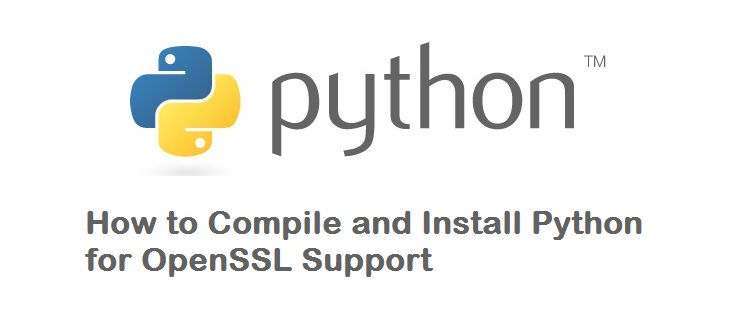Your Python installation does not support SSL? You need to compile it again after editing Setup.dist file located in the Python source directory. Let’s see how to do that.
Before we begin, check if your existing Python installation supports OpenSSL as shown below:
$ python
In the python prompt, type ‘import ssl’
>>> import ssl
If you see error as below, then Python does not support SSL.
$ python Python 2.4.3 (#1, Jan 9 2013, 06:47:03) [GCC 4.1.2 20080704 (Red Hat 4.1.2-54)] on linux2 Type "help", "copyright", "credits" or "license" for more information. >>> import ssl Traceback (most recent call last): File "<stdin>", line 1, in ? ImportError: No module named ssl >>>
Note: In older versions of Python, you may try using ‘hasattr‘ function as shown below:
>>> import socket >>> hasattr(socket,"SSL") False >>>
If you see “False“, then Python does not support SSL.
How to Compile Python from source with OpenSSL Support
Pre-requisites:
OpenSSL should have been installed by default, but if you don’t have one, install it as shown below.
Install OpenSSL and its development packages as below:
$ yum install openssl
$ yum install openssl-devel
(or)
Install OpenSSL from source:
$ wget http://www.openssl.org/source/openssl-1.0.2e.tar.gz
$ ./config --prefix=/usr/local/openssl --openssldir=/usr/local/openssl
Note: By default openssl will be installed under /usr/local/ssl. If you do not want to mess with existing SSL installation, then install it in a different directory.
$ make $ make test $ make install
OpenSSL installation is done. Let’s us now compile Python.
Download Python source:
$wget https://www.python.org/ftp/python/3.5.1/Python-3.5.1.tgz
$tar xvzf Python-3.5.1.tgz
$vim Modules/Setup.dist
Search for “SSL” and uncomment the code as shown below (in version 3.5, from line 203 to 210):
_socket socketmodule.c # Socket module helper for SSL support; you must comment out the other # socket line above, and possibly edit the SSL variable: #SSL=/usr/local/ssl _ssl _ssl.c \ -DUSE_SSL -I$(SSL)/include -I$(SSL)/include/openssl \ -L$(SSL)/lib -lssl -lcrypto
Note: In case, if you had installed OpenSSL in a non-standard location, then you need to change ‘SSL‘ to refer the correct path in the above code.
For e.g,
_socket socketmodule.c # Socket module helper for SSL support; you must comment out the other # socket line above, and possibly edit the SSL variable: SSL=/usr/local/openssl _ssl _ssl.c \ -DUSE_SSL -I$(SSL)/include -I$(SSL)/include/openssl \ -L$(SSL)/lib -lssl -lcrypto
Once done,
$ ./configure $ make $ make install
Check Python for OpenSSL Support
$/usr/local/bin/python3.5
In python prompt, type “import ssl”
>>> import ssl
If you don’t see any error, then Python supports SSL. That’s it!



Worked perfectly for Python 3.10 with OpenSSL version 1.1m. Thanks!
It works for Python 3.10. Very useful info.
I need to prepend the lib path to LD_LIBRARY_PATH.
Thanks
I was looking for this solution for days! Thx!
Very useful, but I had to make two additions to get this to work:
for the python build:
export LD_RUN_PATH=/usr/local/openssl/lib/
./configure –with-openssl=/usr/local/openssl
(from https://bugs.python.org/issue34028#msg367242)
excellent
Thank you.
It is working
thx, work for python3.7.4 🙂
Excellent
Bookmark this one!
Thanks for your appreciation
EXCELLENT
Thanks!!
Quite helpful!!
very helpfulllllll, thank you.
it’s not for python2
Quite helpful!!
thanks